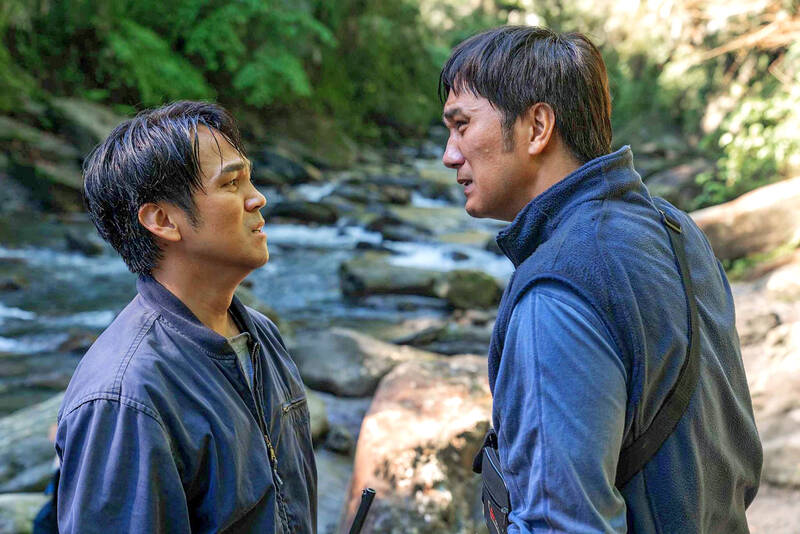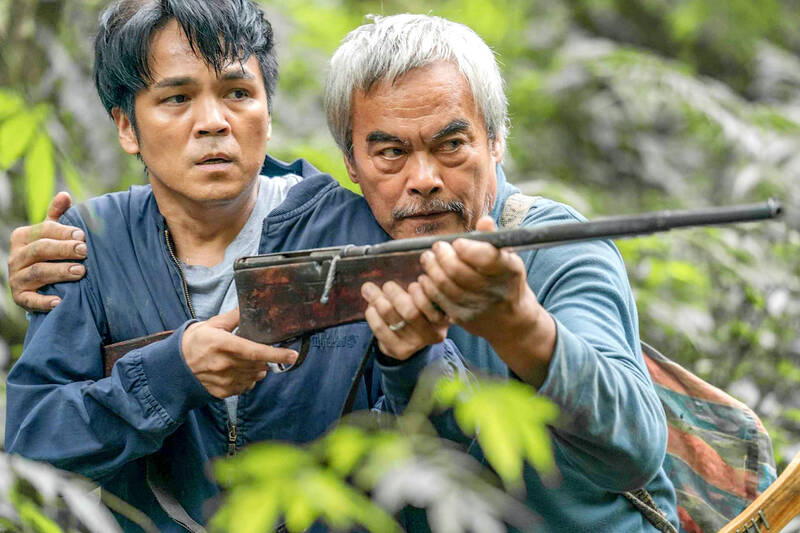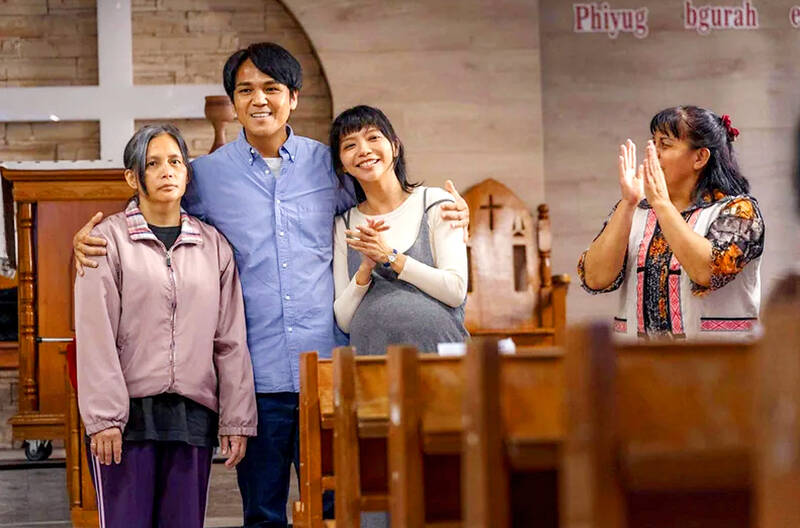Indigenous Truku doctor Yuci (Bokeh Kosang), who resents his father for forcing him to learn their traditional way of life, clashes head to head in this film with his younger brother Siring (Umin Boya), who just wants to live off the land like his ancestors did.
Hunter Brothers (獵人兄弟) opens with Yuci as the man of the hour as the village celebrates him getting into medical school, but then his father (Nolay Piho) wakes the brothers up in the middle of the night to go hunting. Siring is eager, but Yuci isn’t. Their mother (Ibix Buyang) begs her husband to let Yuci stay home, saying that he isn’t suited for hunting, but this only makes the father angrier.
“I’ve inherited such a good hunting ground, but my grown-up son doesn’t even know how to hunt,” the father shouts. He dies that night in an accident.

Photo courtesy of Activator Co
Years later, Yuci has become the village doctor. He is expecting a child with his Han Taiwanese wife Yi-wen (Amy Hsu, 許靈勻), he cares for his mother who suffers from dementia and he’s mulling selling the hunting ground to developers. But his life is overturned when Siring is released from prison for an unspecified crime.
The brothers are complete opposites: Yuci is serious and brooding, while Siring is carefree and brash. Yuci wants Siring to get a job and settle down, but Siring wants to hunt and farm on their ancestral land, even bringing his mother along to Yuci’s horror — and a dramatic, emotional tale unfolds.
Tradition versus modernity is a time-honored theme in Taiwanese cinema, but it’s an especially urgent topic among indigenous communities. After centuries of marginalization and assimilation, they continue to grapple with how to reclaim and preserve their culture while trying to prosper in modern, mainstream society.

Photo courtesy of Activator Co
The father’s death symbolizes the fading of tradition, leaving the brothers to figure out these issues in a rapidly changing world. The mother maintains their connection to each other and the past, but even her mind is dissolving.
Even if one has the desire to live the old ways like Siring, is it really possible under the pressures of the modern world? It’s easy for the audience to be more sympathetic to Siring, but is it a bad thing for Yuci to have his own aspirations? Despite being clearly haunted by the past, he still returned home to serve in the community clinic instead of pursuing a position at a hospital, conversing with the villagers in Truku instead of Mandarin. This bit is intriguing as it’s often when young people move to the cities to find work that their ties to traditional culture and language are cut off and no longer transmitted to their children.
Director Su Hung-en (蘇弘恩), who is half Truku, says that the film is inspired by real-life situations he witnessed in his mother’s community, especially his many uncles with contrasting personalities who often butt heads. Even though parents urge their children to focus on their studies, they also want them to carry on their culture, often favoring those who can, for instance, hunt better. On the other hand, his mother is a respected doctor outside of the village, but at home she’s still bound to patriarchal conventions.

Photo courtesy of Activator Co
Su grew up identifying with his Han Taiwanese side, but his first feature, the 2015 documentary The Mountain (靈山), followed his grandfather’s daily life hunting, farming and praying to the ancestral spirits in the mountains. The fiercely independent Truku were defeated by Japanese colonizers in 1914, enduring decades of discrimination and forced “civilization” afterward. Even though the grandfather was his village’s top hunter, he had to leave to find work and support his family, only returning to his preferred ways in old age after saving up money to rebuild the hunting lodge.
Given this background, it makes sense why Su made this film. But most of all, the tension-filled plot is gripping and the actors deliver vivid and convincing portrayals. There are bits that are not exactly clear, such as why Siring went to jail, which leads to some confusion throughout the film, but overall the story is coherent and suspenseful.
Finally, despite getting much screen time, the character and background of Yuci’s wife, Yi-wen, could have been fleshed out a bit more. As the only Han and outsider character (this is only made explicit in promotional material), it would have been interesting to delve more into her perspective about being caught up in the family strife.

May 11 to May 18 The original Taichung Railway Station was long thought to have been completely razed. Opening on May 15, 1905, the one-story wooden structure soon outgrew its purpose and was replaced in 1917 by a grandiose, Western-style station. During construction on the third-generation station in 2017, workers discovered the service pit for the original station’s locomotive depot. A year later, a small wooden building on site was determined by historians to be the first stationmaster’s office, built around 1908. With these findings, the Taichung Railway Station Cultural Park now boasts that it has

Wooden houses wedged between concrete, crumbling brick facades with roofs gaping to the sky, and tiled art deco buildings down narrow alleyways: Taichung Central District’s (中區) aging architecture reveals both the allure and reality of the old downtown. From Indigenous settlement to capital under Qing Dynasty rule through to Japanese colonization, Taichung’s Central District holds a long and layered history. The bygone beauty of its streets once earned it the nickname “Little Kyoto.” Since the late eighties, however, the shifting of economic and government centers westward signaled a gradual decline in the area’s evolving fortunes. With the regeneration of the once

In February of this year the Taipei Times reported on the visit of Lienchiang County Commissioner Wang Chung-ming (王忠銘) of the Chinese Nationalist Party (KMT) and a delegation to a lantern festival in Fuzhou’s Mawei District in Fujian Province. “Today, Mawei and Matsu jointly marked the lantern festival,” Wang was quoted as saying, adding that both sides “being of one people,” is a cause for joy. Wang was passing around a common claim of officials of the People’s Republic of China (PRC) and the PRC’s allies and supporters in Taiwan — KMT and the Taiwan People’s Party — and elsewhere: Taiwan and

Even by the standards of Ukraine’s International Legion, which comprises volunteers from over 55 countries, Han has an unusual backstory. Born in Taichung, he grew up in Costa Rica — then one of Taiwan’s diplomatic allies — where a relative worked for the embassy. After attending an American international high school in San Jose, Costa Rica’s capital, Han — who prefers to use only his given name for OPSEC (operations security) reasons — moved to the US in his teens. He attended Penn State University before returning to Taiwan to work in the semiconductor industry in Kaohsiung, where he